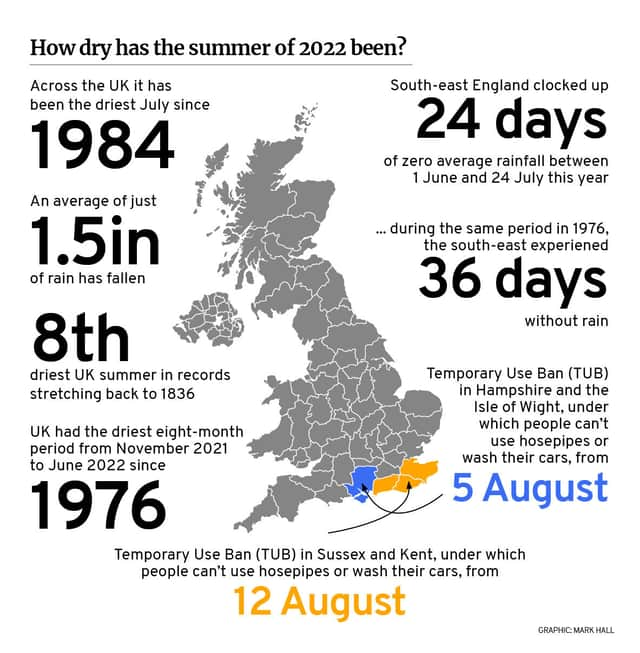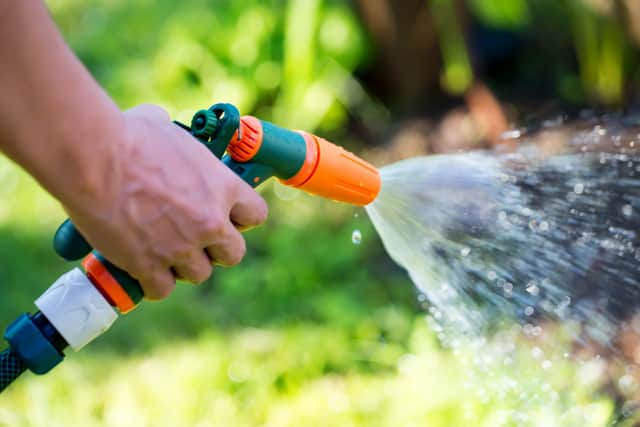Is there a hosepipe ban in my area? Locations of restrictions as South West extends ban in Devon and Cornwall
and live on Freeview channel 276
In 2022, the UK was rocked by unpredictable and extreme weather, with three record-breaking heatwaves and the worst summer dry spell for decades. As a result, drought was declared across most of England, with reservoirs sitting at 65% of their average capacity for the time of year.
At the time, several water companies, including Yorkshire Water, Thames Water and Southern Water, announced hosepipe bans for millions of customers across England and Wales.
Advertisement
Hide AdAdvertisement
Hide AdWhile almost all the hosepipe bans have since been lifted, one introduced by South West Water in August 2022 has actually been extended as of today, 25 April.
But what are hosepipe bans - and how can you check whether your area has one in place?
This is everything you need to know.


What is a hosepipe ban?
When water becomes scarcer than usual, water companies can restrict what we use water for. They can tell when water is becoming scarce by monitoring reservoir or river levels.
In periods of prolonged drought these levels can drop away, forcing water companies to balance our water needs with those of the environment.
Advertisement
Hide AdAdvertisement
Hide AdWhile water companies say the UK is highly unlikely to completely run out of water, they say they sometimes have to implement bans because it can take longer to treat water and move it through the system during prolonged summer dry spells.


Hot weather can also lead to greater water consumption as people drink and shower more, fill up swimming pools or water their plants more regularly - all of which places further strain on the system.
For example, Yorkshire Water said it had to pump 200 million litres more water than usual when high temperatures were recorded on 11 July 2022 - the equivalent of the daily demand of Leeds.
Under the Flood and Water Management Act 2010, water companies have legal powers to restrict how water is used.
Advertisement
Hide AdAdvertisement
Hide AdAnyone ignoring these rules could be prosecuted in a criminal court and fined a maximum of £1,000 - although water companies say they prefer “education over enforcement”.
Southern Water even urged its customers to report anyone not following the rules to its customer services team.


UK hosepipe bans are not common, but scientists warn hotter, drier summers could become more frequent due to climate change.
Before the Southern Water hosepipe ban was announced last year, the last set of water restrictions to have been imposed in the UK were during the summer-long heatwave of 2018.
Advertisement
Hide AdAdvertisement
Hide AdSeven million households in the North West of England and Northern Ireland were forced to temporarily ditch their hosepipes.
Scotland very rarely has to introduce such restrictions.
Hosepipe bans have only been implemented in the country on two occasions over the last 50 years - during the summers of 1976 and 1995.
What are hosepipe ban rules?
Hosepipe bans can be brought in when water companies deem their area to be in a drought, i.e. a prolonged spell of dry weather that has affected water supplies for agriculture, the environment and human consumption.


Under these circumstances, you will be unable to use hosepipes or sprinklers to:
- Water a garden (includes public parks, sports pitches and allotments)
- Clean a motor vehicle
- Fill or top up a pond or paddling pool (you also cannot fill up a paddling pool by any other means)
- Clean windows, paths or patios
Advertisement
Hide AdAdvertisement
Hide AdIf the drought becomes ‘severe’, commercial premises can see their water usage restricted.
For example, they won’t be able to water any outdoor plants.
And if it gets to the stage where a public emergency is declared, households may have their water usage rationed to the extent that they have to fill up bottles at community hubs and only flush the loo a few times per day.
What's going on with the South West Water hosepipe ban?
South West Water was the sixth firm to announce water restrictions in 2022, with households in Cornwall and the western extremities of Devon affected from 23 August. It was the first ban in the area for 26 years, and follows the driest July in the region for almost a century.
Advertisement
Hide AdAdvertisement
Hide AdOn 25 April 2023, South West Water announced that the ban has been extended to include more of Cornwell and parts of Devon as the area continues to experience low levels of rainfall.
The company said that it was taking action in a bid to "break the cycle of drought".
In a statement, South West Water said: "Our region remains officially in drought and a Temporary Use Ban (known as a hosepipe ban) has been in place for Cornwall and a small part of North Devon since August 2022. To further ensure our reservoir levels recovery, and in accordance with our drought plan we will be introducing a Temporary Use Ban for customers within the Roadford supply area, this will affect customers throughout parts of North, West and Mid Devon from 25th April.
"Reservoir levels are recovering across Cornwall and Devon, but remain lower than this time last year. As a result of the low reservoir levels, the hose pipe ban is necessary.
Advertisement
Hide AdAdvertisement
Hide Ad"We recognise and appreciate our customers efforts to reduce their daily water usage throughout this drought period. We ask that you continue saving water where you can, so that our water resources can recover sufficiently for the spring and summer ahead. You really are making a difference."
What's the status of other hosepipe bans?
In 2022, a number of companies announced hosepipe bans - this is the latest status of each ban:
- Southern Water: introduced in Hampshire and the Isle of Wight on 5 August, lifted on 4 November
- South East Water: introduced in Kent and East Sussex on 12 August, listed on 30 November
- Welsh Water: introduced in Pembrokeshire and some adjoining parts of Carmarthenshire in South West Wales, including Pendine and Laugharne on 19 August, lifted on 25 October
- Thames Water: introduced on 24 August, lifted on 22 November
- Yorkshire Water: introduced on 26 August, listed on 6 December
Did Affinity Water introduce a hosepipe ban?
At the time of the bans, there was speculation about whether water supplier Affinity Water would introduce a hosepipe ban. The company serves almost four million customers in: Bedfordshire, Berkshire, Buckinghamshire, Essex, Hertfordshire, Surrey and other parts of the South East.
Affinity Water never did end up introducing a ban, with Ilias Karapanos, a Senior Asset Manager at Affinity Water and a qualified hydrogeologist, stating: "Affinity Water does not have a hosepipe ban (TUB- Temporary Use Ban) at present because we are groundwater dominated, not surface water dominated."
How can you check if there’s a hosepipe ban?
Advertisement
Hide AdAdvertisement
Hide AdYou can see whether or not there’s a hosepipe ban in your area by checking with your water supplier.
Water UK has itself suggested people turn off taps while brushing their teeth, use watering cans instead of garden hoses, and allow lawns to go brown.
The trade body is running a Water’s Worth Saving campaign that provides further tips on how people can reduce water usage.
How can I check my water supplier?
You can see who provides your water by visiting the Water UK website’s postcode checker.
Given water companies only operate in certain areas, you are unable to switch suppliers.
Comment Guidelines
National World encourages reader discussion on our stories. User feedback, insights and back-and-forth exchanges add a rich layer of context to reporting. Please review our Community Guidelines before commenting.
